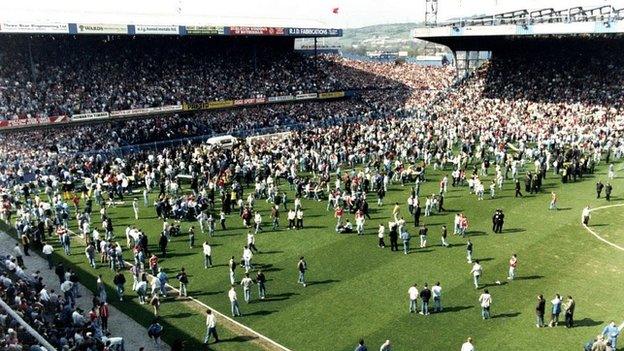Hillsborough inquests: Police officer's 'instructions' on statements
- Published

Ninety-six Liverpool fans died as a result of the crush at the 1989 FA Cup semi-final at Hillsborough
A police sergeant working on the day of the Hillsborough disaster was told what to put in and leave out of his statement by a senior officer, an inquest into the deaths heard.
Philip Colin Lomas said the instructions were given because of "blame" towards South Yorkshire Police.
He said Assistant Chief Constable Stuart Anderson said the disaster was the fault of "drunk, ticketless fans".
Ninety six fans died following the crush at the 1989 FA Cup semi-final.
'Blame was unfounded'
Mr Lomas, who is now retired, was in charge of a group of officers patrolling on Middlewood Road to the south of the Sheffield Wednesday stadium on the day of the tragedy.
The court in Warrington heard he was called to a one-to-one meeting with Supt David Nettleship on the day after the crush and told not to make any notes in his pocket notebook because of "blame" being levelled at the force which was unfounded and "there was a need for a clear accurate account".
He told the court that a few days later, ACC Anderson said at a meeting with about 12 officers at Doncaster Police Station that the disaster was "down to drunk, ticketless fans" and officers should not blame themselves.
The jury heard ACC Anderson wanted specific and detailed notes regarding drunkenness and the number of fans asking for tickets in officers' accounts and not details about radios going down, poor radio transmissions or staffing levels at the turnstiles.
Christina Lambert QC, counsel to the inquests, asked Mr Lomas whether he was tempted to exaggerate after the meetings with Mr Nettleship and Mr Anderson.
He replied: "I have never exaggerated the truth."
Mr Lomas said nothing in his notebook or his statement was exaggerated and he was "proud to have told the truth".
The inquest also heard evidence from an inspector on the day of the disaster.
Anthony Humphries, who is now retired, told the court that no senior police officer was in charge of the response to the tragedy as it unfolded and the only instruction he got was to "help with the injured".
He said "everyone was talking at once over the radio" and no-one was "actually pulling it together".
Mr Humphries said he had been faced with a "pile of bodies" when he went on to the Leppings Lane terraces of the stadium.
'Not dignified'
He told the court he took responsibility for where he was positioned, directing those below him to assist casualties.
Officers worked to take those hurt out of the terrace via the tunnel at the back of it, separating the injured from the dead in the area behind the stand, he said.
Mr Humphries told the inquest he had helped a youth down the tunnel and tried to resuscitate him although he thought he had died.
He said the youth was then put against a wall with his T-shirt pulled up over his face, something he had thought was "not dignified".
He said officers had put some people in an ambulance and then gave first aid until a doctor arrived and set up "a triage-type system".
Asked if he thought some of those who had been considered to have died could have been revived, he said that "other people needed seeing".
He said no instructions were given by senior officers but "just assumed that other people were elsewhere doing other things".
He added he had never considered sending an officer to the nearby police control box to ask for more help.
'Highly-charged atmosphere'
Mr Humphries told the jury the build-up to the Liverpool v Nottingham Forest semi-final had been "just like a normal football match" and, while fans had been drinking beer and wine there was "no nastiness and nobody incapable" and there had been no arrests.
However, he said in the "highly-charged atmosphere", the mood of Liverpool fans changed after the disaster.
"They were really angry, blaming us for being murderers and things like that and swearing and shouting.
"There was some spitting but there were a lot of them waving fists and shouting abuse."
The inquests continue.